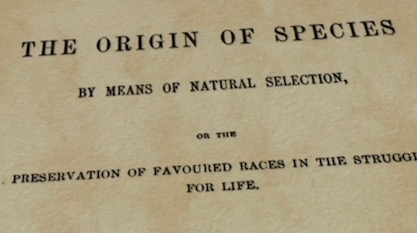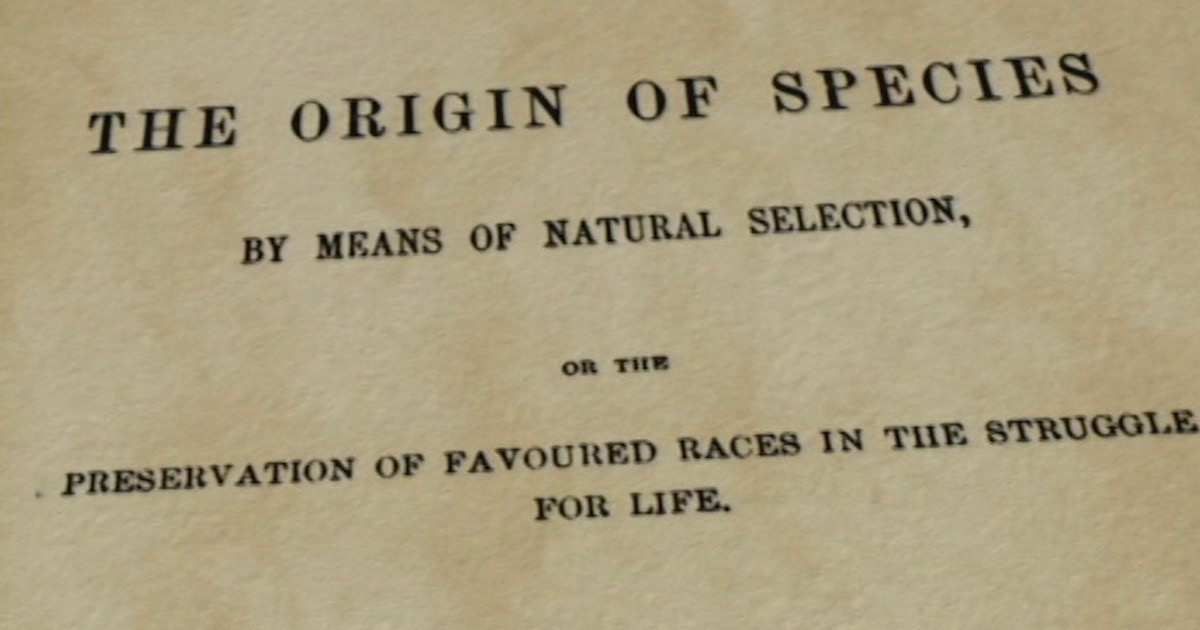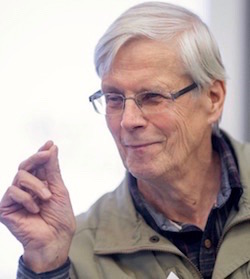 Evolution
Evolution
 Intelligent Design
Intelligent Design
Four Darwin Heretics: A Reader’s Roundup


One, two, three, four books — four recent titles by Darwin skeptics (three scientists, one journalist) in two short years. They are all heretics, all convinced of the same fact: Darwin’s house of cards is collapsing. Science, which is to say the future, is on the side of intelligent design. Let’s look at what they say about the linchpin of Darwinian theory: Charles Darwin’s famous “mechanism” of evolution, natural selection (aka, survival of the fittest). Many would consider Darwinism and natural selection synonymous.
Heretic, by Matti Leisola
 This is a fun read, combining Dr. Leisola’s personal story with well-stated arguments for intelligent design. Co-author Jonathan Witt, a Center for Science & Culture Senior Fellow, helps bring the story to life. Leisola is no slouch among scientists. As a Finnish bioengineer with 140 peer-reviewed articles to his credit, along with experience as a research director and co-founder of a scientific society, his credibility is not assailable. Throughout the chapters, Leisola intersperses episodes of pushback he got from certain colleagues when he began expressing doubts about Darwin back in the 1970s. It starts to get comical after a while. Time after time, all the Darwinians can do is huff and puff, fume and fulminate, threaten and intimidate, but never answer the scientific challenges he puts to neo-Darwinian theory. The occasional professors and students who do take his arguments seriously begin to look like the heroes of the story. And they are! They believe in academic freedom. If Darwinism is so impregnable a theory, what does it have to hide? Let it stand up to scrutiny. Why not? Only totalitarians would wish otherwise.
This is a fun read, combining Dr. Leisola’s personal story with well-stated arguments for intelligent design. Co-author Jonathan Witt, a Center for Science & Culture Senior Fellow, helps bring the story to life. Leisola is no slouch among scientists. As a Finnish bioengineer with 140 peer-reviewed articles to his credit, along with experience as a research director and co-founder of a scientific society, his credibility is not assailable. Throughout the chapters, Leisola intersperses episodes of pushback he got from certain colleagues when he began expressing doubts about Darwin back in the 1970s. It starts to get comical after a while. Time after time, all the Darwinians can do is huff and puff, fume and fulminate, threaten and intimidate, but never answer the scientific challenges he puts to neo-Darwinian theory. The occasional professors and students who do take his arguments seriously begin to look like the heroes of the story. And they are! They believe in academic freedom. If Darwinism is so impregnable a theory, what does it have to hide? Let it stand up to scrutiny. Why not? Only totalitarians would wish otherwise.
Especially delightful is Leisola and Witt’s take-down of natural selection. It’s in Chapter 11, “The Chasm Widens.” They call natural selection the “phlogiston of our day.” (p. 198) For those unfamiliar with phlogiston, it was a mystical substance that 16th-century chemists insisted was the cause of combustion despite mounting evidence against the theory. It took nearly a century to dislodge the consensus, in favor of the oxygen theory proposed by Lavoisier, but many of phlogiston’s believers went to their deaths without admitting defeat. “The story of phlogiston shows how an established paradigm may persist in the face of contrary evidence because its supporters patch it up ad nauseum instead of following the evidence.” Philosophers of science now use phlogiston theory as an example of science in a stumble. Is Darwinism next?
Consider how flexible Darwinism is. Evolutionists wield its heroic mechanism, natural selection, like a magic wand. Leisola and Witt have some fun describing this rubbery, flubbery “explanation” for living things:
The Darwinian theory of evolution is the phlogiston of our day, festooned with a myriad and growing number of patches. Evolution is slow and gradual, except when it’s fast. It is dynamic and creates huge changes over time, except when it keeps everything the same for millions of years. It explains both extreme complexity and elegant simplicity. It tells us how birds learned to fly and how some lost that ability. Evolution makes cheetahs fast and turtles slow. Some creatures it made big and others small; some gloriously beautiful, and some boringly grey. It forced fish to walk and walking animals to return to the sea. It diverges except with it converges; it produces exquisitely fine-tuned designs except when it produces junk. Evolution is random and without direction except when it moves toward a target. Life under evolution is a cruel battlefield except when it demonstrates altruism. And it does all this with a growing number of ancillary hypotheses. Modern evolutionary theory is the Rube Goldberg of theoretical constructs. And what is the result of all this speculative ingenuity? Like the defunct theory of phlogiston, it explains everything without explaining anything well. (pp 198-199)
Only a heretic would assail a holy consensus with such frolic. Maybe that’s because only a heretic can see a house of cards from the outside.
Darwin’s House of Cards, by Tom Bethell
Speaking of houses of cards, Darwin’s theory earned that appellation in Tom Bethell’s book (2017). The author of Darwin’s House of Cards interviewed key Darwinian theorists about the meaning of natural selection. These included Richard Lewontin, Stephen Jay Gould, and philosopher of science Karl Popper. In Chapter 5, Bethell takes “A Closer Look” at natural selection. Intrigued by Norman Macbeth’s presentation of natural selection as a tautology, he began asking leading Darwinists what is meant by “fitness” that supposedly gets “selected” naturally to produce new traits. He finds Darwin’s defenders wobbling all over the place, basically equating selection with chance.
Most amusing is his interview with Richard Lewontin of Harvard. Lewontin flapped his arms and even held ping-pong paddles in his hands to show that natural selection can’t turn a wish to escape predators into actual flight. “Until you’re doing it, you’re not doing it,” he quipped, “and natural selection can’t help.” (p. 67) Unless the organism can already fly, natural selection is powerless. Even worse, as Lewontin admitted to Bethell, natural selection is not even a scientific theory.
For what good is a theory that is guaranteed by its internal logical structure to agree with all conceivable observations, irrespective of the real structure of the world? If scientists are going to use logically unbeatable theories about the world, they might as well give up natural selection and take up religion. Yet is that not exactly the situation with regard to Darwinism? (p. 65)
Lewontin made a “key substantive criticism of natural selection,” asserting repeatedly that it is not falsifiable. And Karl Popper, the father of falsification theory, agreed. He told Bethell in 1988 that his opinion about natural selection had not changed, despite the alleged recantation of some earlier anti-Darwinian remarks. Not only was natural selection not falsifiable, Popper said, it had been falsified “by Darwin’s own theory.” He considered this “feeble” theory a child of its time. (p. 15)
Zombie Science, by Jonathan Wells
Wells makes an additional observation about natural selection in his book Zombie Science (2017). He points out (quoting Darwin) that natural selection reduces to chance: “There seems to be no more design in the variability of organic beings, and in the action of natural selection,” said Darwin, “than in the course which the wind blows.” (p. 19) What really drove Darwin’s proposed mechanism, Wells argues, was a desire to replace design, which suggested the purposeful action of an agent, with materialism. “For Darwin, evolution was completely materialistic.” (p. 27) Darwin’s vision of a great branching tree must avoid all “miraculous additions.” After quoting Darwin again on that point, showing him expecting that “the number of intermediate and transitional links, between all living and extinct species, must have been inconceivably great,” Wells has only one comment before diving into the fossil evidence. “It’s a magnificent image, but it doesn’t fit the facts.” (p. 28)
Undeniable, by Douglas Axe
Another scientist, director of Biologic Institute, weighs in on the “scientific” credibility of natural selection. In his 2016 book Undeniable: How Biology Confirms Our Intuition That Life Is Designed (Harper One), Douglas Axe, like Matti Leisola, had the hands-on experience to see if natural selection was capable of the grandiose claims made for it. Casual readers might miss the important footnote on pp. 281-282 where Axe describes the improbability of beneficial mutations being selected, if they even occur. “People who have done the math on natural selection have also come to a modest view of its power,” he says. Then he proceeds to demolish even the modesty.
From his vantage point, Axe agrees with Wells that materialism is the real justification for Darwin’s theory. (p. 221) Like Bethell, he also agrees that natural selection is a vacuous idea, assuming the existence of the very things it tries to explain. And like Leisola and Witt, he agrees that natural selection is incapable of dramatic improvements in any significant direction that could be considered “progress.” For the final blow, he describes “The Gaping Hole in Evolutionary Theory,” on p. 97:
Evolutionary theory ascribes inventive power to natural selection alone. However, because selection can only hone in on the fitness signal from an invention after that invention already exists, it can’t actually invent.
The Latest, Greatest Version of Natural Selection
Critics of ID might complain we have only quoted the opinions of ID advocates. OK, take a look at a new-and-improved version of natural selection presented by W. Ford Doolittle in PNAS. He and Andrew Inkpen spend a good deal of time showing the flaws in natural selection theory. Nobody can agree on the unit of selection, they admit. Controversies are everywhere. The authors felt compelled to present a new conception of natural selection that can still “Darwinize” the observations without falling prey to the criticisms.
Space does not permit a full analysis of their “ITSNTS Thinking” proposal, but if anyone can read it and not conclude that natural selection has turned animistic, we’d like to know. In their view, natural selection perpetuates processes like the nitrogen cycle, without the need for genes, mutations, or reproduction at all. The definition of his acronym tells you all you need to know. ITSNTS stands for “It’s the song, not the singer.” Individual organisms and even populations come and go, but the song lives on. Any questions?
Image: Courtesy of Illustra Media.
